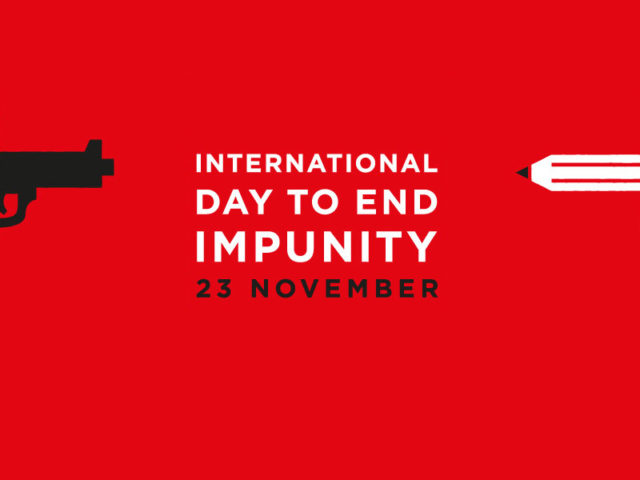
1/11/2018 On the International Day to End Impunity for Crimes against Journalists
02/11/2018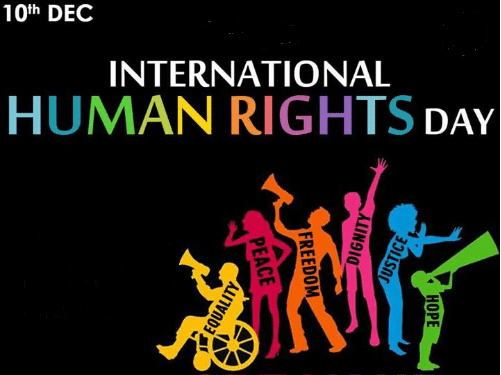
10/12/2018 INTERNATIONAL HUMAN RIGHTS DAY
11/12/20185/12/2018 MONTENEGRO: UNLAWFUL DEPRIVATION OF LIBERTY OF MEMBER OF PARLIAMENT
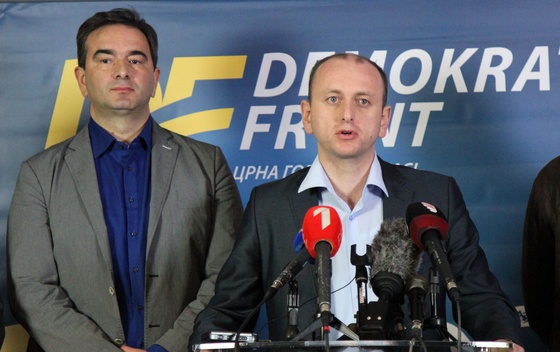
Mps Nebojša Medojević and Milan Knežević
Human Rights Action (HRA) warns that a Member of Parliament of Montenegro, Mr. Nebojša Medojević, has been unlawfully imprisoned and that both his and MP Milan Knežević’s rights to personal liberty, fair trial and freedom of expression were violated due to prison terms imposed upon them for “refusing to testify” to the state prosecutor in the investigation procedures based on their allegations of corruption of judicial authorities. HRA called upon the Constitutional Court to decide on their constitutional appeals in the shortest possible time, finding it essential for the functioning of democracy in Montenegro and protection of fundamental rights of parliamentarians.
Prison sentences to MPs Medojević (in the first of two cases) and Milan Knežević were imposed by the court lacking jurisdiction. The Higher Court in Podgorica and Appellate Court were deciding on appeal filed by the state prosecutor although the Criminal Procedure Code of Montenegro (CPC) does not allow the state prosecutor to appeal the decision of the investigating judge not to punish a witness (CPC Article 119 para. 5).
MP Medojević was sent to prison for two months because, in the first case, during his testimony to the state prosecutor, he did not reveal the identity of the official of the National Security Agency (NCA) who allegedly provided him with information that the Chief Special Prosecutor received a bribe not to request detention in the case against former Mayor of Podgorica. In the second case, he was sentenced for refusing to reveal the identity of persons from the Croatian diplomatic circles who allegedly connected him to a person who witnessed war crimes in which the Chief Special Prosecutor allegedly participated. Two months of prison were also imposed on MP Knežević, who avoids prison by staying in the Parliament, for refusing to provide information about a judge who allegedly offered him 10,000 euros to cancel a guilty verdict against him for attacking a police officer in 2015. The MPs were punished under Article 119 of the CPC, which foresees fines and imprisonment of a person who “refuses to testify without a lawful reason”. In court proceedings against MP Medojević, in which HRA had insight, it was undisputedly established that Medojević did respond to the call to testify and that he did testify on various circumstances, but did not disclose one information – the identity of his source from NCA, and was punished for that.
HRA finds such a wide interpretation of the “refusal to testify” concerning, including punishment of someone who testifies about everything he knows, except for the information that is also possibly unknown to him.
HRA also considers that MPs, like journalists, have the right to protect their sources of information and that they, like journalists, should not be questioned as witnesses according to the Article 108 of the CPC, which stipulates that a lawyer, healthcare worker, journalist, as well as other persons who would violate the duty of preserving professional secrecy with their testimony cannot be heard as witnesses. An MP must enjoy the trust of citizens he/she represents, and the citizens must feel free to approach their MP and communicate information in public interest without fear of exposing themselves to prosecution, loss of job or more severe consequences. The European Court of Human Rights in this context specifically emphasized the importance of freedom of expression of an opposition member of parliament and required the closest scrutiny for any interference with that freedom (Castells, 1992, para. 42).
Imprisonment of MP Medojević also raises the issue of the whistleblower protection, of the NCA official and persons from Croatian diplomatic circles, whose identity Medojević did not disclose and was punished for that, and Medojević himself. The international standards on the protection of whistleblowers provide for protection of their identity and their right to disclose information to an MP. The practice of the Agency for the Prevention of Corruption in Montenegro (the case of Patricia Pobrić) indicates that an MP can also be considered a whistleblower (the Agency denied Patricia protection, finding that she was not a whistleblower, but a “person related to a whistleblower” i.e. MP Mladen Bojanić). The Recommendation of the Committee of Ministers of the Council of Europe on protection of whistleblowers from 2014 emphasizes: “In a democracy, ensuring that a public disclosure of information – to the media or a member of parliament, for example – can be made is a vital safeguard to protecting the public interest and is also enshrined in freedom of expression right (Section 60).” The Law on Prevention of Corruption of Montenegro, which in a separate chapter stipulates the protection of whistleblowers, prescribes that the whistleblower may remain anonymous, as well as adequate protection of his personal data (Articles 46, 47).
Serious doubts in fairness of proceedings in which the MPs were sentenced have been caused by the fact that neither the Special State Prosecutor’s Office nor the High Court in Podgorica were exempted from proceedings, although the allegations of corruption of the Chief Special Prosecutor and a judge of the High Court served as basis for draconian punishment of the MPs.
Regardless of the Higher court’s and Appellate court’s formalistic explanations on how these cases dealt with a failure to fulfil a civic obligation, which does not invoke MPs parliamentary immunity reserved for criminal proceedings and related detention, HRA warns that the two-month prison sentences (Medojević is sent to prison for a total of four months) have the same effect as criminal sentences, but were imposed without fair trial and with disregard for MPs immunity (for more detail, please see the statement of HRA executive director Tea Gorjanc-Prelevic, FOS media, 12/1/ 2018).
Finally, if the real reason behind these proceedings was in essence a legitimate motive to protect the Chief Special Prosecutor and the judge of the High Court from defamation, we emphasize that other procedures have been provided for that purpose in Montenegro. Imprisoning MPs in highly disputable procedure achieved a completely negative effect, which undermines confidence in the judiciary and the ability of state institutions to provide for the rule of law.
Tea Gorjanc-Prelević
HRA executive director
***
MORE DETAILS BELOW
HRA formed the opinion on imprisonment of the MPs upon consideration of the Decision of the Chamber of the High Court in Podgorica Kvs. no. 328/18, from 28 November 2018 (chaired by President of the Court Boris Savić, judges Dragica Vuković and Suzana Mugoša), the appeal of the lawyer Dražen Medojević and the decision of the Chamber of the Appellate Court of Montenegro (chaired by judges Radmila Mijušković, Milić Međedović and Mušika Dujović, President of the Court) and the statement of the High Court in Podgorica from 31 November 2018.
On the violation of the right to liberty
- The Criminal Procedure Code (CPC) does not prescribe the possibility for the state prosecutor to appeal the decision of the investigating judge rejecting the proposal to punish the witness for ”refusing to testify without legal cause”. The High Court in Podgorica, which ordered Medojević’s imprisonment on appeal, as well as the Appellate Court, who confirmed it, did not have legal authority to make those decisions.
The CPC in Article 119, paragraph 5 provides:
“An appeal against a ruling ordering a fine or imprisonment shall be decided by the panel referred to in Article 24, paragraph 7. An appeal against a ruling on imprisonment shall not stay the enforcement”. (Underlined by HRA).
That is all that is prescribed in relation to the right to appeal in the Article 119. The CPC does not contain any other provision stipulating that an appeal against the decision not imposing a prison sentence or imprisonment should be sent to the same panel or another panel or body, so it is clear that the legislator did not predict the possibility for an appeal in such a case.
The High Court and the Appellate Court insist that the appeal against the decision rejecting the proposal to sentence the witness is nevertheless admissible on the basis of Art. 414 of the CPC, which prescribes that an appeal against a decision of the investigating judge is admissible, “unless the appeal is explicitly declared to be inadmissible by this Code.” They consider that the appeal is also admissible under Article 119 because that article does not contain the explicit phrase “appeal is inadmisible”, which is used in the CPC in some other cases.
HRA considers that such an interpretation is unjustified because there is no basis in the provisions of the CPC, in particular, in the provisions of the article 119, paragraph 5 and article 417, paragraph 2, which stipulates: “Unless otherwise prescribed by this Code, an appeal against the ruling of an investigating judge shall be decided by the Panel referred to in Article 24, paragraph 7 of the present Code”. If the legislator wanted to allow the submission of both appeals – appeals against the decision imposing the sentence to the witness and one against the decision that does not impose the sentence – then it would not have prescribed the cited paragraph 5 of Article 119 at all, but would have alowed for the application of the Article 414 of the CPC in this case. In other words, the High Court and the Appellate Court, by their interpretation, declared paragraph 5 of Article 119 meaningless ignored it, while HRA finds no linguistic or logical justification for abrogating the valid legal provision as well as the legislator’s will to adopt it.
Violation of freedom of expression
- MP Medojević was entitled under the Article 108 of the CPC and the right to freedom of expression, according to his function of a member of parliament, to deny the Chief Special Prosecutor the information about the identity of the official of the National Security Agency (NCA) who allegedly informed him about the bribe received by the Chief Special Prosecutor from the former Mayor.
Mr. Medojević asserted that he was not aware of the identity of the NCA official who provided him with the information, but the courts did not trust him and punished him for failing to testify. HRA argues that Medojević had the right to even deny testifying about the identity of the person and that he should have been under pressure to reveal it.
The Article 108 of the CPC, entitled ”Persons who may not be heard as witnesses”, stipulates in paragraph 3 that ”persons who would by giving testimony violate the duty of keeping a professional secret (religious confessors, attorneys-at-law, medical professionals and other health system employees, journalists, as well as other persons)” should not be heard as witnesses ”unless they are relieved from this duty by a special regulation or statement of a person who benefits from the secret keeping.” (Underlined by HRA).
HRA considers that members of parliament belong to the group of “other persons” in the Article 108 CPC for the same reasons for which journalists are entitled to protect their sources. Namely, like journalists, the MP must enjoy the trust of the citizens he represents, and they must feel free to approach him and communicate information without fear of being able to expose themselves to prosecution, loss of job or even more severe consequences. International standards on the protection of whistleblowers speak about the possibility of the protection of their identity, with the right to disclose information to the MP.
The European Court of Human Rights has consistently emphasized the importance of the freedom of expression of the MPs. In the case of Castells v. Spain, 1992, para. 42, the Court stated: “While freedom of expression is important for everybody, it is especially so for an elected representative of the people. He represents his electorate, draws attention to their preoccupations and defends their interests. Accordingly, interferences with the freedom of expression of an opposition member of parliament, like the applicant, call for the closest scrutiny on the part of the Court.”
However, both the High Court and Appellate Court concluded that Medojević “unlawfully” refused to testify and did not even take into account the possibility that he may have not really known the identity of the said officer or that under the Article 108 he may have had the same right afforded to lawyers and journalists.
Regarding the protection of the whistleblowers, the Resolution of the Parliamentary Assembly of the Council of Europe from 2010 “Protection of whistleblowers” prescribes: “the identity of the whistle-blower is only disclosed with his or her consent, or in order to avert serious and imminent threats to the public interest (6.2.1.2).”
The Recommendation of the Committee of Ministers of the Council of Europe to the Member States on the protection of whistleblowers from 2014, in paragraph 14, explicitly stipulates that the whistleblower can also make the disclosure through the member of parliament, and in paragraph 12, that the national framework should foster an environment that encourages reporting or disclosure in an open manner. Individuals should feel safe to freely raise public interest concerns. Recommendation emphasizes: ”In a democracy, ensuring that a public disclosure of information – to the media or a member of parliament, for example – can be made is a vital safeguard to protecting the public interest and is also enshrined in freedom of expression right” (paragraph 60).
The Law on Prevention of Corruption of Montenegro, which provides for the protection of whistleblowers in a special chapter, prescribes that the whistleblower may remain anonymous and that he/she is entitled to adequate protection of their personal data (Articles 46, 47).
Moreover, the practice of the Montenegrin Agency for the Prevention of Corruption (ASK) indicates that the MP himself can be considered a whistleblower, and that he himself is directly covered by the same form of protection. Namely, in the decision of the ASK, which denied Patricia Pobrić the recognition of the whistleblower status, it was stated that she was not a whistleblower but “a person related to a whistleblower”, in that case MP Mladen Bojanić.[1]
Violation of the right to a fair trial
- The right to a fair trial, with regard to the right to an impartial and independent tribunal, requires that judges acting in the proceedings provide with the impression of objectivity. However, the procedures based on the claims that the Chief Special Prosecutor and the judge of the Higher Court in Podgorica received bribes, were conducted by the Special State Prosecutor’s Office headed by the same Chief Special State Prosecutor, as well as the judges of the High Court in Podgorica, without any exemption. Also, the right to a fair trial requires that the tribunal determining criminal charges or civil rights and obligations be ”established by law”, which was not the case in the first case against Medojević and in the case against Knežević as above explained (1).
On the parliamentary immunity of MPs
Constitution of Montenegro, Article 86, para. 2 and 3 states:
”Member of the Parliament shall not be called to criminal or other account or detained because of the expressed opinion or vote in the performance of his/her duty as a Member of the Parliament.
No penal action shall be taken against and no detention shall be assigned to a Member of the Parliament, without the consent of the Parliament, unless the Member has been caught performing a criminal offense for which there is a prescribed sentence of over five years of imprisonment. ”
- Although the Special State Prosecutor and the courts maintained that the procedure MPs were subjected to entailed a question of them failing to abide to a civic duty, and therefore had nothing to do with a criminal proceedings or detention as noted in the Article 86 (Immunity), the procedure imposing a sanction for ”failure to testify without a lawful reason” was part of a criminal procedure and produced the effect of a prison sentence.
Also, bearing in mind the generally perceived ratio for the parliamentary immunity, and that is to prevent arbitrary deprivation of liberty of the MPs that may disable the parliament to carry out its tasks, HRA believes that in good faith, the courts should have at least sought the approval from the Parliament before ordering the police to arrest the MPs, bearing in mind that deprivation of liberty by its nature is a criminal sanction, and that Article 86, paragraph 3 of the Constitution of Montenegro stipulates that such consent must be requested whenever an MP is threatened with deprivation of liberty due to a reasonable suspicion of committing a criminal offense, which is a much more serious situation than the case in which the MP allegedly does not fulfill the civic obligation to testify.
Furthermore, considering that MP Medojević had been arrested by the police around 1 a.m, when the police execute only exceptionally urgent arrests, and following the heated Parliamentary debate, where he had given a speech highly critical of the President of Montenegro, the grounds for his arrest and imprisonment appear even more as an excuse than proper reasoning founded in the need to safeguard the rule of law.
* * *
Relevant legal provisions of the CPC
Persons Who May Not Be Heard as Witnesses
Article 108
The following persons shall not be examined as witnesses:
1) persons who would by giving testimony violate the duty of keeping the data secret within the meaning of regulations prescribing data secrecy, until the competent authority releases them from that duty;
2) defense attorneys may not testify with regard to information accused persons have confided to them in their capacity as defense attorneys;
3) persons who would by giving testimony violate the duty of keeping a professional secret (religious confessors, attorneys-at-law, medical professionals and other health system employees, journalists, as well as other persons) unless they are relieved from this duty by a special regulation or statement of a person who benefits from the secret keeping.
4) minors who, taking into consideration their age and mental development, are not capable to comprehend the importance of the right that they are not obliged to testify.
Measures to Provide for Appearance of Witnesses and Procedural Penalties
Article 119
(1) If duly summoned witnesses fail to appear and do not justify their absence, or if they leave without authorization or justifiable reason the place where they are to testify, the court may order their compulsory apprehension as well as impose a fine in an amount not exceeding €1.000.
(2) If witnesses appear and after being warned and cautioned in line with Article 113, paragraph 2 of the present Code, refuse to testify without a legal cause, they may be punished by a fine in an amount not exceeding €1.000, and if thereafter they still refuse to testify, they may be imprisoned.
Imprisonment shall last until witnesses agree to testify or until their testimony becomes irrelevant or until the completion of the criminal procedure, but not longer than two months.
(3) If witnesses offend the court and other participants in the procedure or threaten them, the court shall warn them and may impose a fine in an amount not exceeding €1.000.
(4) In the preliminary investigation and investigation, the fines referred to paragraphs 1, 2 and 3 of this Article shall be imposed by the court at the motion of the State Prosecutor.
(5) The panel referred to in Article 24, paragraph 7 of the present Code shall decide on an appeal against the ruling ordering a fine or imprisonment. An appeal against a ruling on imprisonment shall not stay the enforcement.
Admissibility of the Appeal against a Ruling
Article 414
(1) Parties and persons whose rights have been violated may file an appeal against a ruling of the investigating judge and against other rulings of the first instance court, unless the appeal is explicitly declared to be inadmissible by this Code.
(2) Unless otherwise prescribed by this Code, rulings rendered by the Panel prior to and in the course of the investigation are not subject to an appellate review.
(3) The investigating judge shall decide on appeals against the rulings of the State Prosecutor, if otherwise not provided by this Code.
(4) Rulings rendered for the purpose of preparing the main hearing and the decision may be contested solely in an appeal against the decision.
(5) Rulings rendered by the Supreme Court are not subject to an appellate review.
Deciding on an Appeal against a Ruling
Article 417
(1) Unless otherwise prescribed by this Code, the second instance court shall decide at a session of the Panel on an appeal against a ruling of the first instance court.
(2) Unless otherwise prescribed by this Code, an appeal against the ruling of an investigating judge shall be decided by the Panel referred to in Article 24, paragraph 7 of the present Code.
(3) When deciding on an appeal, the court may, by a ruling, dismiss the appeal as belated or inadmissible or reject the appeal as unfounded or may honor the appeal and revise or vacate the ruling and, if necessary, remand the case for retrial.
(4) When reviewing an appeal, the court shall by virtue of an office establish whether the first instance court had subject matter jurisdiction or whether the ruling was rendered by an authorized authority.
[1]Ms. Pobrić was a sales director with the Ramada hotel in Podgorica, who revealed through an MP documentation showing that a state agency paid for two conferences held by a political party Socijaldemokrate Crne Gore. After she herself disclosed her identity Ramada did not renew her employment contract and the Agency denied her the status of a whistleblower finding that she was not a whistleblower herself but a ”person connected to a whistleblower”, i.e. to the MP (Decision of the Agency for Prevention of Corruption No. 03-01-2551/16-7, 5 August 2016).


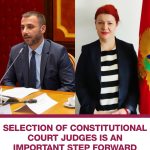
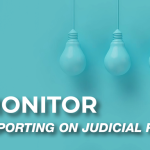
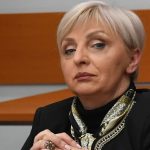

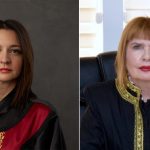
 English
English